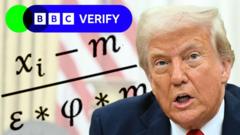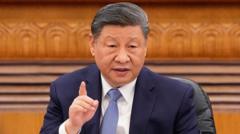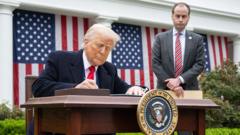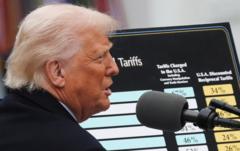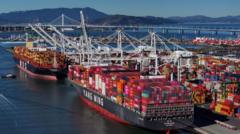Amidst the announcement of new tariffs by US President Donald Trump, global leaders, including Italy's Giorgia Meloni and Australia's Anthony Albanese, have expressed significant concerns.
Trump's New Tariffs Spark Global Reactions from Leaders

Trump's New Tariffs Spark Global Reactions from Leaders
World leaders voice concerns over Trump's tariffs, signaling potential trade disputes.
---
Italian Prime Minister Giorgia Meloni has publicly criticized the recent tariffs imposed by the Trump administration, labeling the decision to charge a 20% tariff on European Union imports as "wrong." This statement came following Trump's "liberation day" announcements, which detail a universal 10% baseline tariff on all imports to the United States starting April 5. From April 9, approximately 60 nations, including those in the EU, will face increased tariffs, with smaller countries notably suffering higher rates, such as Lesotho, which faces a staggering 50% levy.
Despite being known as a Trump ally, Meloni emphasized the negative implications of the tariffs for both Europe and the United States, advocating for a negotiated solution to avert a potential trade war. Her counterpart from Spain, Pedro Sánchez, weighed in, asserting Spain's commitment to protecting its local businesses and endorsing an open global trade system. Meanwhile, Irish officials, including Simon Harris and Taoiseach Micheál Martin, echoed sentiments of regret regarding Trump's decision, identifying the tariffs as detrimental to all parties involved.
Beyond the EU, Australian Prime Minister Anthony Albanese warned that American consumers would bear the brunt of what he termed "unjustified tariffs." He refrained from implementing reciprocal measures, advocating instead for a cooperative approach that avoids escalating trade tensions and seeking to promote orderly growth.
On the legislative front, Brazil's government took immediate steps by passing the Economic Reciprocity Law to counteract the tariffs imposed by Trump. Brazilian President Luiz Inácio Lula da Silva previously expressed that his country must act decisively against such trade measures.
Following the tariff announcements, US Treasury Secretary Scott Bessent urged countries not to retaliate, emphasizing the risk of escalation should they choose to respond in kind. Notably, Canada and Mexico, key US trade partners, were excluded from the new tariff announcements; however, Canadian Prime Minister Mark Carney highlighted the impact of the 25% automobile tariff set to take effect imminently, pledging to fight back with countermeasures.
The unfolding situation has raised critical discussions about the future of global trade and the potential ramifications of such unilateral actions.
Italian Prime Minister Giorgia Meloni has publicly criticized the recent tariffs imposed by the Trump administration, labeling the decision to charge a 20% tariff on European Union imports as "wrong." This statement came following Trump's "liberation day" announcements, which detail a universal 10% baseline tariff on all imports to the United States starting April 5. From April 9, approximately 60 nations, including those in the EU, will face increased tariffs, with smaller countries notably suffering higher rates, such as Lesotho, which faces a staggering 50% levy.
Despite being known as a Trump ally, Meloni emphasized the negative implications of the tariffs for both Europe and the United States, advocating for a negotiated solution to avert a potential trade war. Her counterpart from Spain, Pedro Sánchez, weighed in, asserting Spain's commitment to protecting its local businesses and endorsing an open global trade system. Meanwhile, Irish officials, including Simon Harris and Taoiseach Micheál Martin, echoed sentiments of regret regarding Trump's decision, identifying the tariffs as detrimental to all parties involved.
Beyond the EU, Australian Prime Minister Anthony Albanese warned that American consumers would bear the brunt of what he termed "unjustified tariffs." He refrained from implementing reciprocal measures, advocating instead for a cooperative approach that avoids escalating trade tensions and seeking to promote orderly growth.
On the legislative front, Brazil's government took immediate steps by passing the Economic Reciprocity Law to counteract the tariffs imposed by Trump. Brazilian President Luiz Inácio Lula da Silva previously expressed that his country must act decisively against such trade measures.
Following the tariff announcements, US Treasury Secretary Scott Bessent urged countries not to retaliate, emphasizing the risk of escalation should they choose to respond in kind. Notably, Canada and Mexico, key US trade partners, were excluded from the new tariff announcements; however, Canadian Prime Minister Mark Carney highlighted the impact of the 25% automobile tariff set to take effect imminently, pledging to fight back with countermeasures.
The unfolding situation has raised critical discussions about the future of global trade and the potential ramifications of such unilateral actions.










